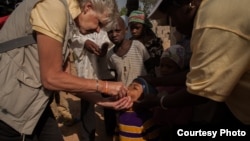A Nigerian military offensive against Islamist insurgent group Boko Haram has opened up a corridor for mobile units of health workers to vaccinate children against polio in parts of the northeast.
But the worsening insurgency poses a grave risk to the campaign to stamp out the crippling virus in Africa's most populous nation. Nigeria, Pakistan and Afghanistan are the three countries in the world in which polio is still endemic.
Aid workers say a change of approach in Nigeria, using 'hit and run' mobile units that can race into dangerous places when security improves and then get out quickly, has enabled vaccination in zones that previously were off limits.
“We have not gotten this close to getting rid of polio [in Nigeria] before,” Abdulrahman Tunji Funsho, chair of the Nigeria PolioPlus Committee of Rotary International, one of the main organizations behind the campaign, told Reuters.
Boko Haram, which is fighting to set up an Islamic state in religiously-mixed Nigeria, has killed health workers doing polio vaccinations during its five-year-old insurgency, although Funsho said that had not happened since January last year.
There had been only four new cases of polio this year so far -- three in Kano State, which has been largely spared Islamist violence apart from the occasional bomb attack in its capital city, and one in Yobe state, Funsho said.
That compared with 53 cases last year, although the high season for transmission of the disease is from July to December, during and just after the rainy season.
Boko Haram's violence in rural areas has intensified since the government declared a state of emergency last year in the northeastern states of Borno, Yobe and Adamawa.
Funsho said the military campaign had driven the group out of northeastern cities like the Borno state capital Maiduguri, though, creating a space for health workers.
“As far as inoculation is concerned, it hasn't made things worse. The picture is better: we're reaching more children,” said Funsho.
Better access
In 2003/2004, politicians and religious leaders in largely Muslim northern Nigeria, which has always maintained a fierce rivalry with the more prosperous and developed mostly Christian south, impeded efforts to eradicate polio by spreading rumors that the vaccines caused infertility and AIDS.
The only two other African nations still suffering cases of polio are Cameroon and Somalia, and all the cases came indirectly from Nigeria, said Funsho.
Polio hits the nervous system and can cause irreversible paralysis. The World Health Organization [WHO] warns children everywhere are at risk until it has been completely wiped out.
The flow of people displaced by the Boko Haram insurgency to cities from villages had in some ways made it easier to tackle polio, according to Melissa Corkum, spokeswoman for the United Nations Children's fund [UNICEF].
“People are coming out of the security-compromised ... rural areas and to the metropolitan areas like Maiduguri, so we have an opportunity to immunize,” she said. “We are now able to go into areas where last year we weren't able to, but it's always changing. Last year, say February, every area was red, but now ... we have had better access.”
But Corkum said there were still plenty of no-go areas, with 300,000 children still inaccessible. Boko Haram attacks in the northeast are continuing.
Heidi Larson, a lecturer at the London School of Hygiene and Tropical Medicine who has helped win acceptance for the polio inoculation campaign in Nigeria, said suspicion in the Muslim north remained a hurdle.
“What happened with Nigeria and the north was a game changer because ... [we] realized the power of rumor. Since then, there has been more attention given to community concerns and more engagement with traditional and religious leaders,” she said.





